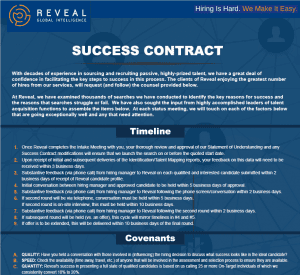Former chain smokers can tell you they knew engaging in such a habit was unhealthy and damaging.
They can also inspire as they tell you the relief associated with finding a more enjoyable life with the knowledge of a different path. It’s always cool to hear about transformations in the lives and life experiences of others. I get as much fulfillment listening to the personal stories as I do when I hear of professional transformations.
When you have been a student of the talent acquisition profession as long as I have, you tend to notice patterns or recurring habits that make no sense, are harmful to the recruiting process and even the people involved.
A number of years ago, I began to believe that the most common reasons a search or hiring project will succeed, struggle, or fail could be summarized and shared with hiring managers and interviewers as a guide to successful hires.
After finalizing this one-page document, I asked for input from current leaders of talent acquisition in corporations who could help with any finishing touches. The Success Contract was the term I chose for this guide since a recruitment consultant or talent acquisition professional could ask for hiring managers (and interviewers) to enter into an agreement to achieve success for the recruiting need(s).
What I really am honored to see is how some of our corporate clients have come to adapt and adopt the document. As Oscar Wilde so famously stated, “Imitation is the sincerest form of flattery…” More rewarding is how some of our clients have elevated its effectiveness by wrapping training around the methodology that we shared with them to further make it work for them.
The Success Contract focuses on Timelines and Covenants (really, an agreement for successful actions) of the hiring manager and the interviewers.
Timelines –
“Time is Money. Time Kills All Deals. Time’s-a-Wastin’.” Any of these clichés are accurate in this context. Any of us who has hired another person can likely remember the occasions in which we were the candidate. No top talent candidate, whether an applicant or a passive candidate (with tentative interest), wants to be put through the hoops of scheduling, rescheduling, inconsistent communication, treated as someone who was a surprise on their schedule (unprepared), or to be forgotten or ignored.
Timelines, as you might imagine, are based on the foundational steps in the process.
However, many hiring managers will readily admit that they’ve never been trained in top talent assessment and selection or anything close to it. So, they are often welcoming of your guidance.
The common steps or milestones of the Timelines include:
- From initial intake/strategy/briefing meeting – to – initial resumes/CVs
- From the review of resumes/CVs – to – feedback from the hiring manager
- From any phone screens or interviews – to – feedback from the hiring manager or interviewers
- From receipt of feedback – to – sharing the feedback with candidates
- From the date of the offer – to – continued communication and pre-onboarding
The details in Reveal’s Success Contract will show standard timelines and address other junctures such as travel, other communication, assessments, background checks, offers, reference checks, the start date, and the onboarding steps.
Covenants –
Now that timeline expectations are addressed, we need to make covenants or commitments, internally. A covenant is an agreement, especially by contract. This is why we choose to use the term Success Contract for the one-page tool used at our recruiting firm, Reveal, in which the hiring leader is asked to reach an agreement to each of the following covenants:
- QUALITY: Have you held a conversation with those involved in (influencing) the hiring decision to discuss what success looks like in the ideal candidate?
- SPEED: Check the availability (time away, travel, etc.) of anyone that will be involved in the assessment and selection process to ensure they are available for interviews and can provide feedback on candidates quickly.
- DECISIONS: Discuss (with those involved in the process) how decisions will be made, by whom, and discuss timelines.
- COORDINATE: Have you ever been part of an interview process where each person with whom you met asked the same questions and/or repeated what others already shared? It’s a BIG turn off – especially to top talent passive candidates. Avoid this by following the “S.A.T.” approach in which you coordinate which members of the assessment and selection team will SELL key points of the job, the company, and the group; ASSESS key job criteria, the experience of the candidate, etc.; TELL the candidates what they need to know so they can make an informed decision.
- NEW CRITERIA: Once the search is approved, introducing new criteria by which candidates will be evaluated will lead to a failure of the Success Contract.
- DIRECTION & DATA: Directing your recruitment consultants and team to pursue companies that do not employ the talent you seek and/or providing names/lists of previous prospects who are not on-target will create additional time and expense.
Reveal’s Success Contract includes six additional covenants and, of course, you would likely modify the language we’ve used to suit your culture and recruiting process. The consultative approach in delivering this guidance to hiring managers and interview teams is where this document moves from a flat and forgettable one-pager to a memorable and meaningful experience. Another key to making this work is to emphasize that you are asking the hiring manager and interviewers to be accountable to a successful process, not to you. Diplomacy and professionalism here are paramount to making this work.
Want to learn more about how you can leverage the Success Contract?
Click Below for a video and to request the Success Contract!
ntent here…


